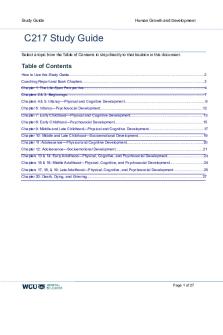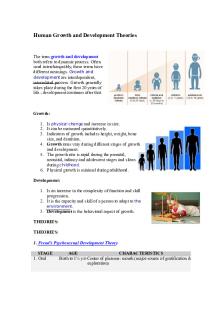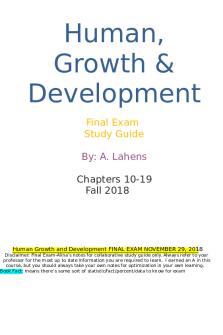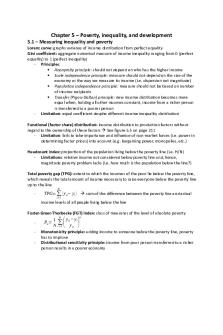Human Growth AND Development ALL Notes PDF

| Title | Human Growth AND Development ALL Notes |
|---|---|
| Author | Laura Trythall |
| Course | Human Growth and Development |
| Institution | Birmingham City University |
| Pages | 85 |
| File Size | 1.2 MB |
| File Type | |
| Total Downloads | 46 |
| Total Views | 137 |
Summary
Full and detailed Notes for all Lectures in Human Growth and Development Module including Life Course Theory, Psychodynamic Theory, Child Development, Attachment Theory, Adolescence, Theories of early and middle adulthood, Barriers to development and Ageing and Loss....
Description
HUMAN GROWTH AND DEVELOPMENT Theories of Lifespan Development
Objectives:
Introducing the module outcomes and assignment.
Introducing the concept of “life course” perspectives.
Identifying points of Transition and Stress.
Reflecting on own life experiences and life path.
Considering the extent to which nature and nurture play a role in developing human growth and development.
Identifying significance for social work practice.
Life Course
Defined as “the progression and path an individual takes from conception to death” (also called life span or life cycle)
Life course perspective – “a viewpoint that considers the whole of life as offering opportunities for growth development & change”
( Crawford & Walker 2007)
Life Course theory
Influenced by range of theoretical perspectives including
Sociological theory – which explores social and environmental structures and policies and how these influence human development
Biological theory – theories which explain human growth and ageing in terms of physiology, genetic influence, evolution
Psychological theory– study of peoples thoughts and feelings and how these influence behaviour and development
Paul Baltes (1987) Lifespan psychology •
7 principles of life- course thinking
-
development is a lifelong process
-
Development is Multi-dimensional and multi directional
-
Development Is plastic and flexible process - changed by life experience and circumstances
-
Involves both gains and losses
-
Interactive process between individual and environment
-
Culturally and historically embedded
-
requires multi-disciplinary approach to study.
Social Policy & Legislation •
Policy and legislation also take a life course perspective
•
Children Act 1989 (updated 2004)– welfare across their childhood.
•
Every Child Matters 2003 outcomes are concerned with future stages – economic well being, making positive contribution, enjoy & achieve.
•
Mental Capacity Act 2005 - enabling people to make choices and owning responsibility for them.
•
Our Health Our Care Our Say 2006– giving people choice in the care they receive at different points in life.
•
Valuing People Now 2009 - preparation for independence, moving people forward in their development.
•
Care Act 2014- importance of promoting independence and well being.
Life Transitions Definition: •
“ A change from one form or type to another, or the process by which this happens” ( Cambridge Dictionary)
•
Changes in experience often brought about by changes in role expectations or external environment
•
Significant level of change – requires significant re-structuring of individuals sense of self, responses and coping mechanisms
•
Usually require lengthy period of re-adjustment (6-12months)
•
Both negative and seemingly positive events impact individuals and lead to transition
•
Growing body of psychological theory relating to coping with change & crisis and motivational coaching.
Erik Erikson “ 8 Stage Psycho-Social model” •
Childhood & Society 1950
•
Erikson informed by work of Sigmund Freud but also included consideration of individual’s interaction with external society hence “psycho-social”.
•
Identified series of 8 potential Crises in which the individual must resolve inner conflicts to progress to next stage of development.
•
He defines Crisis – conflict between inner psychological motivation (desire) with social role expectations (duty)
•
Outlines possible favourable and unfavourable outcomes from each stage.
•
Suggested that for majority of people a balance of these two forces was achieved leading to resolution
•
Where resolution is partial of problematic leads to development and personality challenges for individual and for society.
8 life stages –each with point of transition. •
Hope - Basic Trust vs. Mistrust - Infant stage. First year child needs consistent care to experience secuirty
•
Will - Autonomy vs. Shame and Doubt - Toddler stage. 2-3 years – child developing sense of independence from parents
•
Purpose - Initiative vs. Guilt Pre-school 4-5 years- child explores her environment and plans new activities
•
Competence - Industry vs. Inferiority – School age – 6years to puberty Child acquires important skills relating to culture and society
•
Fidelity - Identity vs. Role Confusion - Adolescence –young person seeks coherent personal & vocational identity
•
Love Intimacy vs. Isolation - Young adulthood – seeking deep and lasting relationships
•
Caring - Generativity vs. Stagnation - - individual seeks to be productive and make contribution – anxiety can lead to Mid-life crisis.
•
Wisdom - Ego Integrity vs. Despair – Older Adulthood – reviewing and evaluating what have accomplished in life
E.G: Constructions of Adolescence
•
All societies make a distinction between children and adults, but they view the transition in different ways (Crawford and Walker, 2007).
•
In most western cultures, the transition between childhood and adulthood is viewed as a separate stage, often characterised as being a highly problematic time, with little emphasis on the positive developments achieved during this period.
Family Life Cycle Models •
Stage models of family life also exist.
•
Offer contrasting view to life course models due to emphasis on the individual within a family structure.
•
Reuben Hill(1968) & Evelyn Duvall(1957) came up with original models.
•
Influenced by Role theory – ideas about roles different individuals take on in society and Models of family stress – identifying causes of conflict in families
•
Adapted by McGoldrick & Carter (1999) USA based - six stages model which is based on:
•
Members joining or leaving family unit (through number of routes).
•
Members entering new developmental stage - family shares developmental task with individual.
•
Members role within family or wider environment changes and impacts family dynamics. ( external aspects).
•
Emotional processes in response to any of these changes also factor into the stage model. Carter & McGoldrick (1999)
Critical perspective - culture & diversity •
These models have been developed in Western Industrial & Capitalist societies and reflect some of those values, structures and prejudices. Unlikely to neatly transfer to other cultures and societies but likely to be areas of overlap
•
Theories of life course development and family life cycle will differ significantly according to geography and culture, experience of oppression and discrimination, historical context and economic/ social structures
•
Black theorists are identifying their own theories of developing black identity ( Robinson 2007)
•
Models have needed to be adjusted for changing social trends - less marriage, single parents, fewer children, social mobility, growing unemployment etc. Do they still retain meaning in terms of roles?
•
Models of Cultural Competence emerging to begin to address this (Laird 2008) and theories being revised (McGoldrick et al 2010)
Adult Social Work •
Adults with a mental health diagnosis
•
Adults with a disability/ learning disability
•
Older Adults
•
Adults with a sensory impairment
•
Adults accessing behavioural or forensic services
•
Adults within Probation & prison services
•
Adults needing community or residential care
•
Parents with a learning disability
•
Adults within hospitals and experiencing Hospital discharge
•
Resettlement from long stay hospitals
•
Promoting adults independence
•
Safeguarding vulnerable adults
What do these experiences have in common? •
Families in transition and under stress
•
Individual factors – emotional reactions, coping skills, illness & disability
•
Structural factors – poverty, discrimination
•
Environmental factors
•
Societal factors
•
Culture & community factors
•
Usually a combination of transition events and other external/ internal stressors
•
We need a sound understanding of life course developments to understand the developmental tasks and expectations associated with each stage and within a specific culture or family Understanding ourselves Conclusion
•
Listening to & understanding how someone tells the story of their life is essential – how do they describe their experiences?
•
Understanding where significant points of transition, change and loss might occur is useful in assessment (but need to be culturally sensitive and not make assumptions).
•
Using a framework of life stages can help you make sense of the situation and think of questions to ask.
•
Need awareness of our own experiences of transition and loss and how this have impacted our own lives in order to integrate effectively into practice.
References: •
Paul Baltes 1987 “Theoretical propositions of lifespan developmental psychology” in Developmental Psychology Vol 23 P 611-628
•
Chris Beckett & Hilary Taylor “Human Growth & Development 2 nd Ed” Sage London
•
K Crawford & J Walker” Social work and Human Development. 2 nd Ed.” Learning Matters Exeter.
•
Evelyn Duvall 1957 Family Development. Lippincott. Philadelphia
•
Erik Erikson 1995 Childhood & Society (New ed) Vintage books
•
Hopson, B. and Adams, J. (1976) 'Towards an undertanding of transition: defining some boundaries of transition dynamics', in Adams J., Hayes, H. and Hopson, B. (eds) Transition: Understanding and Managing Personal Change, Martin Robertson, London.
•
Reuben Hill 1971 “Families Under Stress” Greenwood.Press. London
•
Laird, Siobhan. E. (2008) Anti-Oppressive Social Work: A Guide for Developing Cultural Competence. SAGE Publications
•
M. McGoldrick, B. Carter & N. Garcia-Preto 2010 “ The Expanded Family Life Cycle 4 th Ed.” Allen & Unwin. New York
•
Jean Piaget (2001) “The Psychology of Intelligence” Routledge
•
Lena Robinson (2007) “Cross Cultural Child Development for Social Workers” Palgrave Macmillan Basingstoke
•
Lev Vygotsky 1962 “Thought & Language” Wiley. New York
Psychodynamic Theory in Social work Practice
Learning Objectives
Review basic assumptions of psychodynamic approach
Identify basic concepts and how they have been developed
Identify some of most significant theorists in this context.
Consider relevance for modern social work practice
Consider theory from a cross cultural and Anti oppressive viewpoint.
Major Theorists
Sigmund Freud
Melanie Klein
Anna Freud
Erik Erikson
Donald Winnicott
Wilfred Bion
Carl Jung
Basic Assumptions The psychodynamic approach: •
Assumes a person’s adult personality and way of relating to others is shaped largely by their childhood experiences.
•
Theories differ in their emphasis on internalised processes or inter- relational /social processes
•
Assumes that client may not be consciously aware of their true motives and impulses behind their actions/ responses
•
The Unconscious is identified as a major influence on present behaviour
•
Assumes therapy can help through interpretation of the relationship between therapist and client and through exploring the “unconscious” e.g. through dream analysis, free association.
•
(McLeod 1998)
Freud’s Theory of Psycho- sexual development Freud saw the “libido” or “sexual drive” as the primary motivating force in human development. (alongside fear of death)
Identified a number of stages •
Oral stage ( up to 1 ½ years) – babies get pleasure from sucking, biting, swallowing, focus of much activity
•
Anal stage ( 1 ½ years – 3years) – children get pleasure from developing control over their defecation and managing faeces.
•
Phallic ( 4 – 7 years) – pleasure focus shifts to genitals, but at immature level. Also experience awakening sexual rivalry with their same sex parent – Oedipus/ Electra Complex
•
Latency ( 8 – puberty) less active awareness of genital sexuality, same - sex peer identification
Mature genital stage ( onset of puberty onwards) Sexual satisfaction and pleasure becomes major drive again, seeking sexual partner.
•
Oedipus/Electra Complex
Freud’s most (in)famous idea
During phallic stage, child becomes aware of their emerging sexual identity.
Move away from identification with same sex parent, become more interested in opposite sex parent.
Sense of rivalry with SSP for the attention of OSP
Unconscious process, not erotically charged.
We see these ideas in some of our language -“ daddy’s girl” “mummy’s boy” “sugar daddy” “toy boy”
The Unconscious: Theory of the mind
The “Id”
– primitive instincts and impulses which are ultimate motives for behaviour.
“Pleasure Principle”.
No time concept – immediate expression and gratification
stored memories can feel very real and emerge unexpectedly in present
The “Ego”
conscious rational part of the mind
makes decisions and deals with external reality
the Reality principle”
Mediates between other parts of mind
Super-Ego
Idealised
developed “conscience”
Internalised rules and taboos, usually derived from parental guidance and prohibition.
Also cultural norms and expectations
Implications: •
Most of the mind’s processes are beyond our conscious awareness – but still influence our behaviour & reactions
•
Ego states are likely to be in conflict frequently – ego trying to suppress excesses of the id and reconcile ideals of the superego to the real world
•
Increasing our understanding of our unconscious processes will help us manage our responses and be more self aware.
•
Unresolved conflicts at each stage of development will influence our emerging personality
Psycho-analytic techniques: -
Free association – saying whatever comes to mind
-
Dream analysis - “ the royal road to the unconscious”
-
Interpretation of resistance and defence mechanisms.
-
providing a “blank screen” through therapist neutrality, to allow focus on transference of client onto therapist.
-
Later, his daughter Anna Freud recognised the value of Play in this context too
Transference •
Freud believed that through therapist neutrality (not revealing anything of self in therapy) the client would begin to reveal their feelings and unconscious motivations relating to their parents/ other sources of anxiety.
•
They would transfer their feelings from early relationships and tend to re-enact these with their therapist who would be able to identify them as belonging to another context.
•
This transference then becomes the object of interest in the therapeutic relationship and the focus of therapist’s interpretation.
Counter transference
•
Counter transference refers to the feelings within the therapist/worker which emerge within the work relationship
•
These have two sources
•
therapists own psychodynamic processes which are prompted by some aspect of the client’s own defences. Eg. Reminds me of my father – this would need to be taken to therapist’s therapy
•
Therapist’s responses are a reaction to transference relationship with patient and can help the analysis process – e.g. therapist notices unexpected feelings towards client e.g. of boredom, revenge, irritation
Anxiety & Defense mechanisms Freud believed that in order to avoid feelings of “anxiety”, we have a variety of defence mechanisms in place which defend us unconsciously Arise from conflicts between id & superego Can be healthy or maladaptive but both designed to reduce tensions
Anna Freud (1936) identified a number of defense mechanisms
Repression
Denial
Projection
Rationalization
Intellectualisation
Regression
Displacement
Splitting Examples of defenses:
•
Repression – not allowing unpleasant thoughts to surface, not considering something have done wrong
•
Denial – not accepting reality of something when in shock, to avoid pain.
•
Projection - “ That person does not like me” – avoiding one’s own conflict about feelings towards that person by projecting them on to others.
•
Rationalisation “ I didn’t want to do that anyway” –makes us feel better and preserve self esteem
•
Intellectualise – avoid the emotional aspect, make a detailed plan about how to resolve a crisis while avoiding the fear.
•
Re...
Similar Free PDFs

Human growth and development
- 46 Pages

Growth and Development Notes
- 10 Pages

EPC 202 Human Growth AND Development
- 28 Pages

Growth & Development
- 4 Pages

Growth and development chart
- 9 Pages

Growth and Development CH01 exam
- 40 Pages
Popular Institutions
- Tinajero National High School - Annex
- Politeknik Caltex Riau
- Yokohama City University
- SGT University
- University of Al-Qadisiyah
- Divine Word College of Vigan
- Techniek College Rotterdam
- Universidade de Santiago
- Universiti Teknologi MARA Cawangan Johor Kampus Pasir Gudang
- Poltekkes Kemenkes Yogyakarta
- Baguio City National High School
- Colegio san marcos
- preparatoria uno
- Centro de Bachillerato Tecnológico Industrial y de Servicios No. 107
- Dalian Maritime University
- Quang Trung Secondary School
- Colegio Tecnológico en Informática
- Corporación Regional de Educación Superior
- Grupo CEDVA
- Dar Al Uloom University
- Centro de Estudios Preuniversitarios de la Universidad Nacional de Ingeniería
- 上智大学
- Aakash International School, Nuna Majara
- San Felipe Neri Catholic School
- Kang Chiao International School - New Taipei City
- Misamis Occidental National High School
- Institución Educativa Escuela Normal Juan Ladrilleros
- Kolehiyo ng Pantukan
- Batanes State College
- Instituto Continental
- Sekolah Menengah Kejuruan Kesehatan Kaltara (Tarakan)
- Colegio de La Inmaculada Concepcion - Cebu









